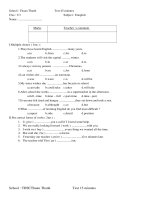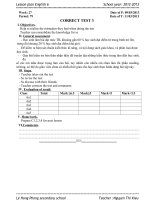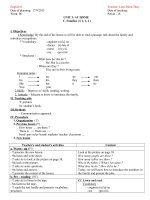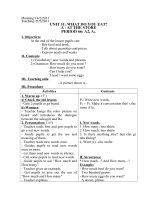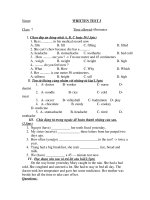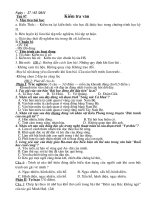KHBD TIẾNG ANH 6 TUẦN 26 TIẾT 75-77 79 UNIT 12 B3-5 C1-4 ÔN TẬP Unit 12 C5-6
Bạn đang xem bản rút gọn của tài liệu. Xem và tải ngay bản đầy đủ của tài liệu tại đây (204.7 KB, 14 trang )
<span class='text_page_counter'>(1)</span>Date of preparing: 10/3/2021 Period 75 UNIT 12- Sports and pastimes LESSON 4: B3-5. (P.128). A. The aims of the lesson 1. Knowledge + The aims: By the end of the lesson , ss will be able to ‘ how often...?” questions and answers “ once / twice / three times / ...a week” to talk bout frequency of activities *Language What do you do in your free time? I play soccer. What does she do in her free time? She reads books. How often does she read? She reads once a week. How do you read? I read three times a week *Vocabulary: How often, once a week, twice a week, three/ four times ... a week. 2. Skills: - Practice listening, speaking, reading, writing. 3. Attitude: Help ss to have good consciousness in order to use ‘ how often...?” questions and answers “ once / twice / three times / ...a week” to talk bout frequency of activities B. Preparations 1.Teacher: posters, computer, speaker, projector 2. Students: Unit 12 B3-5 C. Methods: - Model-Talk-Practice, individual work, pair work - Some techniques can be used: matching, Substitution drill, Find someone who D. Procedure : I. Organization: (1’) - Greeting Class Date of teaching absent students 6A 6B 6C Teacher ,s activities Students, activities II. Warm up (5m) Listening Matching: A4 P.128 - Go through the pictures - Ask ss to speak out what words used for each picture ss listen and give the ideas.
<span class='text_page_counter'>(2)</span> - Ask ss to listen to the teacher and match the names with the right pictures. Answer keys: Tan reads. Minh and Nam play video games. Lien watches TV. Lan and Mai listen to music. III.: New lesson: Step 1*Presentation: -. 1.Pre- teach vocab: (8m) How often Once a week Twice Three times 2.Matching: one on B. Once a week Twice a week Three times a week. ss match one by M T W T h v v v v v. F S S v. 3:Presentation dialogue : B5 P.128 - Set the scence : ( draw faces with names) ss listen and answer we are going to read the dialogue between Mai and Lien about Ly’s free time activities - Guide ss to read the dialogue ss follow the instruction Model sentences: ss listen and and answer then How often does she go jogging? copy down listen to music? read? She goes jogging once listens to music twice a week reads three times Step 2:Practice: 1.Substitution drill: (4m) Cues: ( numbers from one to seven but not in right order) - T says : ss say One once a week.
<span class='text_page_counter'>(3)</span> Two Three .... 2.Picture drill: B5 – Ly’s diary - T runs through the pictures cues in Ly’s diary speak - T give an example : How often does Ly go to school? school six. twice three times. ss listen and ss: she goes to times a. week. - Ask ss to do the same Step 3:Production: *.Find someone who - T ask ss to coy the table and do as the example ss work in groups of 5 Find someone who ... Nam e ...plays football twice a week ...goes to the park once a week ...watches TV seven times a week ...plays badminton twice a week ...does homework sixtimes a week IV.Consolidation: - Remind the content of the lesson. V.Homework :( B105 - workbook) *Evaluation: .......................................................................................................... .......................................................................................................... .......................................................... Date of preparing: 10/3/2021 Period 76 UNIT 12-Sports and pastimes LESSON 5: C1-4 (P. 130- 131) A. The aims of the lesson 1. Knowledge + The aims: By the end of the lesson , ss will be able to get adverbs of frequency.
<span class='text_page_counter'>(4)</span> ( always / usually / sometimes / never) and further practice in “ how often…?” to talk about frequency of activities *Vocabulary: always, usually, often sometimes, never have a picnic, fly their kites, go camping, tent. *Language: - the simple present tense - The position of adverbs of frequency How often do Ba and Lan go to the zoo? They sometimes go to the zoo. How often do you help your mom? I always help my mom. 2. Skills: - Practice listening, speaking, reading, writing. 3. Attitude: Help ss to have good consciousness in order to get adverbs of frequency (always / usually / sometimes / never) and further practice in “ how often…?” to talk about frequency of activities B. Preparations 1.Teacher: posters, computer, speaker, projector 2. Students: Unit 12 C1-4 C. Methods: - Model-Talk-Practice, individual work, pair work - Some techniques can be used: Noughts and crosses, W & W, Grid D. Procedure : I. Organization: (1’) - Greeting Class Date of teaching absent students 6A 6B 6C Teacher ,s activities activities. Students,. II: Warm up (5m) Noughts and crosses two groups swim? week Swim. ss play in S1 : How often do you S2 : Twice a Play tennis. Go to school. Read a book Play football. Watch TV. Listen to. Do. Play volleyball.
<span class='text_page_counter'>(5)</span> music homeowork III: New lesson: Step 1*Pre- reading: 1.Pre teach : C1 P.130 - always (adv): luụn luụn individual - usually(adv): thường thường. ss : choral,. copy down - often(adv):thường xuyên - sometimes( adv): đôi khi, thỉnh thoảng - never (adv) : khụng bao giờ * checking vocab: what and where - Have ss repeat the words in chorus then rub out word by word but leave the circles. Remember to let ss repeat before and after rubbing out each word. listen and repeat - Go on until ss can remember the words - Get ss to write the words again in the correct circles play in two groups vvvv. x. vvv. Ss ss. v v v. Step 2*While reading: 1. Listen and read: C1 (p.130) 2. Matching: -T asks ss to use the pictures and read the text about Ba to match Vietnamese with the new words in the context ss read the text and match one 1. thả diều a. go camping by one on the board 2. cái lều b. fly a kite 3. đi cắm trai c. have a picnic 4. đi dã ngoại d. a tent - answer key: 1- b ; 2- d ; 3-a ; 4 – c 3.Grid : (6m) ( with answer key) - ask ss to read the text again and fill in the table work individually. ss.
<span class='text_page_counter'>(6)</span> How often do they ...go to the zoo ...go to the park ...have a picnic ...play sports ...fly kites ...go camping ...walk to school ...do homeowrk. nev er. someti mes v. ofte usual alwa n ly ys v. v v v v. 4.Answers given: (5m) a. about three times a year go to the zoo? b. twice a week the park? c. No, never d. Yes, always school?. v v ss make questions: a. How often do they b. how often do they go to c. Do they go camping? Are they late for class d .Do they walk to Do they do their homeowrk?. Step 3*Post reading: C4 - P.131 - Writing: - Ask ss to write the answers for the ss work individually questions in C4 P.131 -T correct if necessary IV: Summary: adverbs of frequency (always / usually / sometimes / never) and further practice in “ how often…?” to talk about frequency of activities V:Homework ( C1 – 4 - workbook) *Evaluation: .......................................................................................................... .............................. …………………………………………………………………………….. .......................................................................................................... .......................
<span class='text_page_counter'>(7)</span> Date of preparing: 10/3/2021 Period:77 REVIEW A. The aims of the lesson 1. Knowledge + The aims: By the end of the lesson, ss will be able to further practice in likes and dislikes (simple present tense), adjectives, question words and the present progressive tense contrast with the present simple tense, quantifiers, ... * Vocab: food, drink, feeling adjectives, appearance adj * LF: Present simple tense, present progressive 2. Skills: - Practice listening, speaking, reading, writing. 3. Attitude: Help ss to have good consciousness in order to practice in likes and dislikes ( simple present tense) , countability, adjectives, question words, present progressive , quantifiers, ... B. Preparations 1.Teacher: posters, computer, speaker, projector 2. Students: REVIEW C. Methods: - Model-Talk-Practice, individual work, pair work - Some techniques can be used: Filling, Ask and answer, Dialogue build, LN, Arranging. D. Procedure : I. Organization: (1’) - Greeting Class Date of teaching absent students 6A 6B 6C Teacher ,s activities activities. Students,. II : New lesson: Activity 1: Present simple. T. reminds the way to use the present simple tense. Form: a) Affirmative. S + V / Vs, es + O.
<span class='text_page_counter'>(8)</span> Ex :. I like an orange. He likes an orange. Verbs go with the third singular subject, we have to add “s,es” after the verb. b) Negative. S + do not. +V +O. does not. In the negative sentences, we have to add “do or does” before verb. Ex : I don’t like an orange. He doesn’t like an orange. c) Yes/ no question. Do + S + V + O ? Does. Ex 1: Choose the correct form of the verb in simple present tense. 1) Monica (eat) ____________________ eggs. 2) Teddy and Monica (eat) _____________________ eggs. 3) Mickie (study) ____________________ English every day. 4) Arthur and Jason (study) _____________________ English on Monday and Tuesday. 5) Angie and I (drink) _______________________ coffee. 6) Eva (like) _______________________ chocolate. 7) Dustin (watch) ______________________ movies. 8) Yoko (play) ______________________ the piano. 9) The students (take) _____________________ tests. 10) It (rain) ______________________ here a lot. Activity 2: a, an, some, any. T. asks Ss to remind the way to use “a, an, some, any”. + a, an are used with countable nouns, but only with singular noun. + some and any are used with both countable and uncountable nouns. With countable nouns they only go with plural nouns. (A – An: nghĩa là Một (đứng trước danh từ đếm được số ít) -An đứng trước danh từ bắt đầu là một nguyên âm: a, e, i, o, u -> an apple, an orange. -A đứng trước các danh từ bắt đầu là một phụ âm còn lại. a book, a chair Some – Any: nghĩa là một vài, một ít (đứng trước danh từ đếm được số nhiều và các danh từ không đếm được) Some: dùng cho câu khẳng định và lời mời. Any: dùng cho câu phủ định và nghi vấn.) Net words: ss work in three groups Some.
<span class='text_page_counter'>(9)</span> A. Sandwich Banana. An. orange apple. fish noodles ss work. individually Ex 2. Fill in the blanks with a, an, some, any. 1. There isn’t … milk in the jar. 2. She’d like … orange. 3. There are … oranges and bananas. 4. Is there … meat? 5. There aren’t … noodles. KEY 1. There isn’t .any. milk in the jar. 2. She’d like .an. orange. 3. There are .some. oranges and bananas. 4. Is there .any. meat? 5. There aren’t .any. noodles. EX 3 Fill in the blanks with a, an, some, any. 1. There is … milk in the bottle. 2. There are … onions on the table. 3. Do you need … expensive house? 4. Do you like … meat for breakfast? 5. She buys … new hats for her children. KEY. Điền “some, any, a hay an” thích hợp vào chỗ trống. 1. There is .some. milk in the bottle. 2. There are .some. onions on the table. 3. Do you need .an. expensive house? 4. Do you like .some. meat for breakfast? 5. She buys .some. new hats for her children..
<span class='text_page_counter'>(10)</span> Activity 3: Adjectives. T. reminds the way to use adjective. * Pelmanism: - Prepare 10 cards with numbers on one side and the work in two groups countries and their cities on the others - Make sure the countries and their cities are mixed up. - Stick the cards on the board so students can only see the numbers. Divide students into two teams and ask them to choose two numbers. Turn the cards over and see if they match. If not, turn the cards over again and ask the next team. - Continue until all the cards are turned over tall long hot fat heav wea y k shor shor cold thin light stro t t ng EX 4. Fill in the gaps a) He isn't tall. He is short. He is ________. b) He isn't thin. He is ________. ________. c) He isn't heavy. He is ________.g) are ________. d) He isn't weak. He is ________. h) ________.. e) f). ss. He isn't hungry. He isn't hot. He is. His lips aren't full. They His hair isn't short. It is. Activity 4. Question words. T. asks Ss to remind all question words and the usage of them. Who : ai ? ( hỏi vào chủ hoặc tân ngữ chỉ người.) What : gì ? cái gì ? ( hỏi và vật, sự việc) Where: ở đâu? ( hỏi vào vị trí, địa điểm, nơi chốn) When : khi nào ? (hỏi vào thời gian) What time : mấy giờ ? ( hỏi vào giờ) Why : Tại sao ? ( hỏi nguyên nhân) What color: màu gì ? ( hỏi về màu sắc) How : như thế nào ( hỏi với tính từ) Ex 5 Choose the correct answer to fill in the blank. 1.A: _________ is your favourite cartoon? B: It is Kung Fu Panda. A. Who B. What C. When D. Why 2. A: _________is the weathergirl on VTV3 at 8 o'clock tonight? B: She is Hoai Anh. A. Who B. What C. When D. Why.
<span class='text_page_counter'>(11)</span> 3. A: _________ is the film “Harry Potter”? B: It is very mysterious and thrilling. A. Who B. What C. When D. How 4. A: _________ is the studio of Vietnam Television? B: In Hanoi. A. When B. Where C. Why D. How 5. A: _________ do people like watching game shows? B: Because they are educational and entertaining. A. When B. Where C. Why D. How Activity 5: Progressive tense: - Ask ss to remind the form and use of the progressive tense. + Form: S + is/ am/ are + V- ing + Use: - Ask ss to do the exercise by using the word in blanks with the right tense. Ex 6: 1. Every morning, Mai (have)…………. breakfast at 5.30 and now she (have) …………..with her parents. 2. What you (do)……………. after school? - I ( play)…………… volleyball. 3. My father (read)………….. newspaper and my mother (watch) ………………. TV at the moment. 4. Where he (go)? - He’s going to the movies. - Ss work in pairs to ask and answer the questions. Activity 6: Quantifiers: Lucky numbers: ss play in two groups 1. What does oil come in? ( a bottle) 2. What does tea come in? ( a packet) 3. What does soap come in? ( a bar) 4. LN 5. What does soda come in? (a can) 6. LN 7. What does iced tea come in ? ( a glass) 8. What does chocolates come in ? ( a box) 9. What does noodles come in ? ( a bowl) 10. What does water come in ? (a glass) 11. LN 12. What doestoothpaste come in ? (a tube) ss work individually Activity 7: Ex 7. Arrange the words to make meaningful sentences..
<span class='text_page_counter'>(12)</span> 1. 2. 3. 4. 5. 6.. some/ want/ milk/ these/ students. a glass of/ likes/ orange juice/ Nam. much/ how/ he/ does/ want/ beef? isn't/ short/ hair/ his. Lan/ chicken/ or/ like/ does/ drake? would/ you/ dinner/for/what/ like?. IV: Summary - Remind Ss how to use of question words and the contrast of the present progressive tense with the present simple tense, quantifiers, ... V: Homework - Do the exercise Điền mạo từ thích hợp vào chỗ trống 1. 2. 3. 4.. I want ………… apple from that basket. Miss Lin speaks ………… Chinese. I borrowed ………… pen from your pile of pencils and pens. Eli likes to play ………… football. 5. I bought ………… umbrella to go out in the rain. 6. I lived on ………… Main Street when I first came to town. 7. Albany is the capital of ………… New York State. 8. My husband’s family speaks ………… Polish. 9. ………… apple a day keeps your enemy away. 10. Our neighbors have ………… cat and ………… dog. Review: Unit 9-12. Prepare: TEST 45’ * Evaluation: ……………………………………………………………………….. Date of preparing: 10/3/2021. Period 79. UNIT 12-Sports and pastimes C5-6 (P. 132-133) A. Aims : By the end of the lesson , ss will be able to read a short text to understand the details and get further practice in simple present tense with adverbs of frequency 2. Practice skill: - Practice listening skill,writing, speaking skill. reading skill 3. The knowledge needs to get:. + Standard knowledge: + Advanced knowledge: 4. Basic language: * Vocab: wear (v) clothes (n) boots (n) stove (n) overnight (adv).
<span class='text_page_counter'>(13)</span> 5. Attitude: Help ss to have good consciousness in order to read a short text to understand the details and get further practice in simple present tense with adverbs of frequency B. Teaching- aids: Lesson plan, textbooks, pictures, poster. C. Methods: - Model-Talk-Practice, individual work, pair work - Some techniques can be used: D. Procedure : I. Organization: (1’) - Greeting Class Date of teaching absent students 6A 6B 6C Teacher ,s activities. Students, activities. II: Warm up ( 7m) Brainstorm ride a bike. fly a kite. go walking. ss write on the board In two groups. Pastimes in the Play games country go to the mountain go to the river go camping go fishing swim III: New lesson: 1. Listening: C5 P.132 - T runs through the pictures a) – e) ss listen and speak - Ask ss to predict how often Nga and Lan do these ss predict Things - ask ss to listen and check their predictions ss listen and check - answer: a) never b) often c) usually d) often e) sometimes Step 1* Pre reading: 1. Pre- teach vocab: (8m) wear (v) ss : choral, individual clothes (n) repetition., then copy boots (n) stove (n) overnight (adv) * Checking voab : R – O – R.
<span class='text_page_counter'>(14)</span> 2.T/ F prediction: then a.Minh likes going swimming. partners b.He often goes on the weekend. c.He usually go with his parents. d.They often go to the park e.They always wear strong boots and warm clothes f.They take food and water and a camping stove. ss predict individually, compare with their. Step 2*While reading: 1. Checking the prediction: - ask ss to read the text and check the prediction ss read and check - answer: a.F d. F b.T e. T c.F f. T 2. comprehension questions: (8m) Lucky Numbers - Go through the questions a) – f) on P.133 - Ask ss to ask and answer the questions in pairs ss work in pairs a. what does Minh like doing? a b c d b. What do Minh and his friend always wear? c. LN! e f g h d. When does he go? e. Who does he usually go with? f. Where does he often go? g. LN! h. What do they take? Step 3*Post reading: Transformation writing: - Ask ss to have a look at the text again and realize what subjects there are and what information is then ask them to change the subjects and the informtation to make another paragraph about their pastimes , beginning like this: I like .................................. IV: Summary: A short text to understand the details and get further practice in simple present tense with adverbs of frequency V: Homework: Finish the writing + C5-6). Prepare the next lesson. *Evaluation: ……………………………………………………………………………………… …………………………………………………………………………………..
<span class='text_page_counter'>(15)</span>

